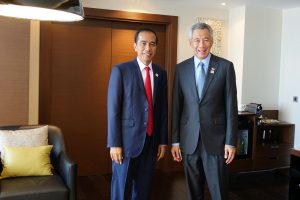This week, Singapore’s president made her first state visit to Indonesia in her current capacity. The trip spotlighted the continuing management of opportunities and challenges in the bilateral relationship between the two sides and highlighted newer areas of collaboration being explored across various realms.
As I have noted before in these pages, while the relationship between Indonesia, Southeast Asia’s largest state, and Singapore, the region’s smallest, has tended to be prickly historically speaking, the two countries have nonetheless tried to maintain a cordial relationship across the political, economic, security, and people-to-people realms.
For instance, during the last highest-level interaction between the two sides – the Indonesia-Singapore Leaders’ Retreat between Indonesian President Joko “Jokowi” Widodo and Singapore Prime Minister Lee Hsien Loong – both sides had announced new collaboration in areas such as economic and people-to-people ties and had also discussed ways to manage existing challenges for relations such as airspace management.
This week, the bilateral relationship was in the headlines again with the visit of Singapore’s president to Indonesia. Halimah Yacob was in Indonesia for a scheduled state visit from February 3 to February 6, and she was accompanied by officials with a series of portfolios including foreign affairs, culture, social and family development, and culture, community, and youth, along with a business delegation.
Halimah’s visit, with stops in Jakarta and Yogyakarta, included a series of interactions. She met with a range of officials including Jokowi and Vice President Ma’ruf Amin in Jakarta as well as the governor of Yogyakarta, Sri Sultan Hamengkubuwono X.
Per a press release by Singapore’s Ministry of Foreign Affairs (MOFA) released during the visit, the meetings between Halimah and Jokowi and Amin focused on the potential for greater collaboration in areas such as digital economy, Industry 4.0., youth and leadership exchanges, and interfaith dialogue. In terms of agreements, Halimah and Jokowi witnessed the signing of a double taxation agreement and noted the signing of a memorandum of understanding between the Singapore Police Coast Guard and Indonesia’s Directorate of Customs and Excise on February 3 regarding information exchange and conduct of regular joint operations, patrols, and bilateral training.
Apart from that, Halimah’s visit also saw her undertake other interactions that highlighted the economic and people-to-people components of bilateral relations. Per Singapore’s MOFA, these included viewing some tangible examples of Singapore-Indonesia cooperation – such as the Singapore International Foundation project on occupational therapy for children with special needs, an Industry 4.0 training program, and a start-up incubation community in Yogyakarta – as well as a reception with Singapore and Indonesian business leaders, a reception with the Singapore community in Jakarta, and a dialogue with students of Gadjah Mada University.
To be sure, Halimah’s visit was just one among many interactions between Singapore and Indonesia. Nonetheless, the high-level, introductory state visit helped spotlight the breadth of the relationship. Both sides to continue to find new areas of collaboration, including in economic and people-to-people ties, which often do not make the headlines as much as political and security developments.

































